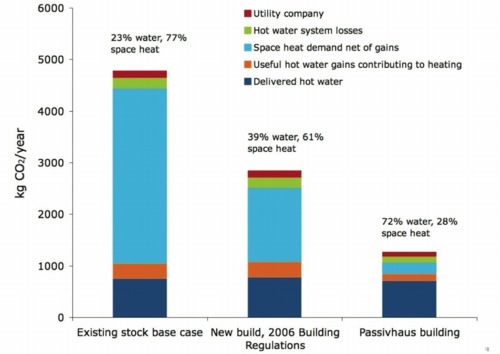The future of water efficient buildings
Dr Judith Thornton describes an alternative approach to reducing water consumption in homes and non-domestic buildings.
The Code for Sustainable Homes (CSH) is the main way in which the UK Government is aiming to encourage us all to build more environmentally sustainable houses. The water component of CSH is mandatory and uses a ‘water calculator’, which takes the form of a spreadsheet where the water consumption of the various appliances in the home are added together to produce a total. This approach was also incorporated into the proposed revision of Part G of the Building Regulations.
The initial water calculator was widely criticised by all parties; following a review, changes have been made to the water calculator in 2009. This is good news for the building industry, in that the various code levels are now considerably easier to meet, but bad news for those who like policy to be based on evidence.
There is little evidence on which to base a calculator approach, so ‘normalisation factors’ are incorporated in lieu of data. For example whilst there is no evidence that a household with a bath and shower uses more water than a household with just a shower, the CSH water calculator makes it almost impossible to reach higher code levels without either doing without a bath completely, specifying one that is too small for comfort, or adding around £3000 to the build cost by installing a rainwater harvesting system.
In the mean time, an alternative standard has been launched by the AECB, the Sustainable Building Association. The AECB standard is based on requirements for individual fittings, rather than a notional total water use. As such, it is equally appropriate for retrofit as for new build. It addresses a number of defects that are inherent in the CSH water calculator. For example it does not allow appliances to be traded off against one another, considers what is actually likely to be acceptable to the householder and, with an eye on CO2 emissions, requires good initial plumbing system design to minimise dead legs.
Hot water
Recent studies by the Environment Agency and the Energy Savings Trust have demonstrated that 89% of the CO2 emissions associated with water are attributable to water use in the home, primarily due to hot-water use. CO2 emissions from water supply, abstraction, conveyance, treatment and wastewater disposal are therefore a relatively minor concern, compared to what occupants do with water. Further, when building to higher thermal standards (such as the German Passivhaus standard, or higher levels of CSH), the CO2 emissions due to hot-water use will exceed those from space heating (see chart).
Future regulations are likely to force building-services engineers to pay more attention to the design of hot-water systems and appliances. Attention to detail at the initial design of plumbing systems (such as boiler placement and length of pipe runs) will bring performance benefits (reduced wait time for hot water) and save energy. Radial plumbing systems may be appropriate with microbore pipework to low water use appliances such as wash basins. Beware of lazy designers who stick to large pipes and compensate with secondary circulation or trace heating, as these will increase energy cost.
Let it rain?
Many building-services engineers have looked at rainwater harvesting to provide non-potable water for some uses, such as toilet flushing. However, these systems have a higher environmental impact than mains water, as evidenced by numerous life-cycle-assessment (LCA) studies from Switzerland, Australia and the UK. Neither can they actually provide for significant water demand in water-stressed areas; in a study of the potential for water neutrality in the Thames Gateway, RWH was not regarded as one of the favoured options, on the basis of it meeting insufficient demand (36 l/household/day with an average roof area of 50 m2) relative to the installation costs.
In addition to woeful environmental performance, systems rarely pay back either the capital investment or their running costs. Calculations on payback for reclaimed water systems have tended to assume zero maintenance costs, zero electricity costs and that parts never require replacing. As with all services, engineers should remain sceptical about manufacturer’s claims, and should talk to users of buildings where such systems have been installed; the most recently published independent report of an installed rainwater harvesting system indicated that the cost of harvested rainwater was £30/m3 (Preston Water Efficiency Initiative).
Conclusions

The appliance-based water-efficiency standards suggested by the AECB are simple and robust. They are equally appropriate to new build and retrofit, domestic and non-domestic buildings. In an era where our buildings are expected to be climate friendly, we cannot afford to lose sight of the CO2 impacts of water services, so hot-water system design is critical; bigger pipes waste energy when they cool down and lead to long waits for hot water.
Building occupants require simple systems that offer good performance and are cheap to run. Rainwater systems simply do not to live up to these requirements.
Dr Judith Thornton is a water and sewage consultant (www.water-works.org.uk) and academic (University of East London & Centre for Alternative Technology).
References and links:
AECB water standard and technical guidance document: http://www.carbonlite.org.uk/
carbonlite/waterstandards
EST/EA study on CO2 emissions from hot water use: www.energysavingtrust.org.uk/
waterreport
Both of the above contain extensive references, and further references are available from the author on request.








